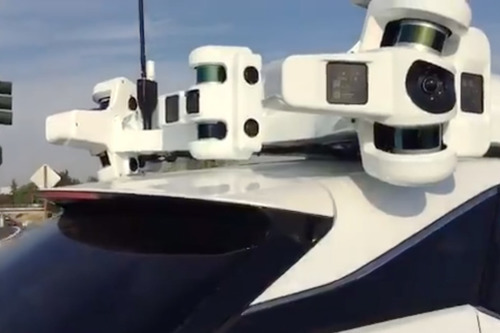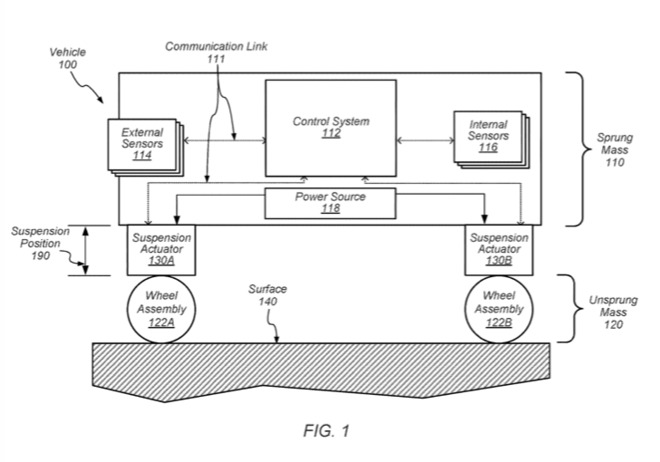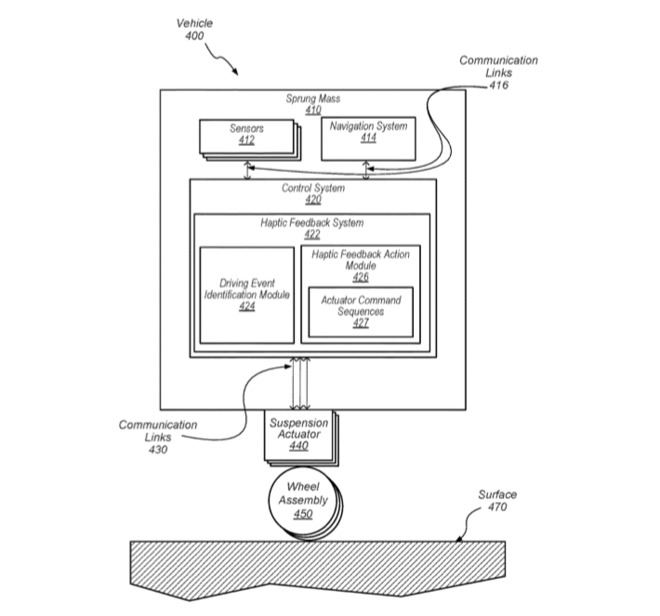Apple's Car could include haptic feedback and limit motion sickness
A newly-revealed patent for a fully-actuated suspension system shows Apple has been working on ways for an Apple car to provide a smoother ride through hardware and software.

An Apple car test bed.
The patent application for "Fully-actuated suspension system", was filed with the U.S. Patent and Trademark Office in March 2016 but was published this week. It describes how a mixture of hardware, such as variable-pressure air springs, and software such as a haptic-feedback system, could make a car's ride smoother.
"The system can compensate for vehicle oscillations at frequencies below the primary ride frequency," says the patent document, "thereby mitigating the risk of occupant motion sickness."
While most of the patent refers to haptic feedback about braking and suspension being transmitted "to at least one occupant of the vehicle," the main claim is specifically about a driver. "The system can communicate information to a driver, via haptic feedback provided via actuator displacements," it says, "which can augment the driver's situational awareness."
Apple's patent further describes how a vehicle's braking, suspension and general ride could be improved. "The system includes a variable pressure air spring which can adjust the neutral suspension position and execute low-frequency displacements and a hydraulically-driven piston which can execute high-frequency displacements," it says.

The patent's main drawing showing how the suspension system would work in a vehicle
"The system can provide augmented vehicle braking via displacing the unsprung mass of the vehicle towards the surface upon which the vehicle rests," continues the patent, "to increase the normal force... induced by applied braking pressure to the wheel."
Apple files many patents and it is typical for them to take years to publicly surface, as has happened with this one. However, details of this suspension patent have come to light shortly after recent claims that the company is said to be building large drive rooms in California for testing.

Detail of how the haptic feedback system would be arranged
Previously, Project Titan had been believed to evolve from Apple's creating an entire car itself -- often dubbed simply Apple Car by fans and the media -- to the company developing systems for other motor firms. That belief was because, despite other patents to do with self-driving car systems, Apple has had rounds of laying off hundreds of staff on the project.
This suspension patent is credited to Thaddeus Stefanov-Wagner and Randol Aikin. The latter left Apple in 2017 to work first at Uber, and is now at Ike, a San Francisco company working on self-driving trucks.

An Apple car test bed.
The patent application for "Fully-actuated suspension system", was filed with the U.S. Patent and Trademark Office in March 2016 but was published this week. It describes how a mixture of hardware, such as variable-pressure air springs, and software such as a haptic-feedback system, could make a car's ride smoother.
"The system can compensate for vehicle oscillations at frequencies below the primary ride frequency," says the patent document, "thereby mitigating the risk of occupant motion sickness."
While most of the patent refers to haptic feedback about braking and suspension being transmitted "to at least one occupant of the vehicle," the main claim is specifically about a driver. "The system can communicate information to a driver, via haptic feedback provided via actuator displacements," it says, "which can augment the driver's situational awareness."
Apple's patent further describes how a vehicle's braking, suspension and general ride could be improved. "The system includes a variable pressure air spring which can adjust the neutral suspension position and execute low-frequency displacements and a hydraulically-driven piston which can execute high-frequency displacements," it says.

The patent's main drawing showing how the suspension system would work in a vehicle
"The system can provide augmented vehicle braking via displacing the unsprung mass of the vehicle towards the surface upon which the vehicle rests," continues the patent, "to increase the normal force... induced by applied braking pressure to the wheel."
Apple files many patents and it is typical for them to take years to publicly surface, as has happened with this one. However, details of this suspension patent have come to light shortly after recent claims that the company is said to be building large drive rooms in California for testing.

Detail of how the haptic feedback system would be arranged
Previously, Project Titan had been believed to evolve from Apple's creating an entire car itself -- often dubbed simply Apple Car by fans and the media -- to the company developing systems for other motor firms. That belief was because, despite other patents to do with self-driving car systems, Apple has had rounds of laying off hundreds of staff on the project.
This suspension patent is credited to Thaddeus Stefanov-Wagner and Randol Aikin. The latter left Apple in 2017 to work first at Uber, and is now at Ike, a San Francisco company working on self-driving trucks.

Comments